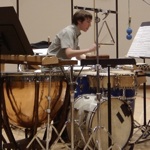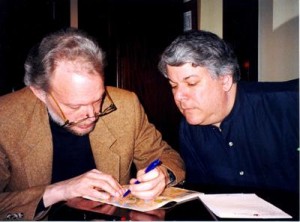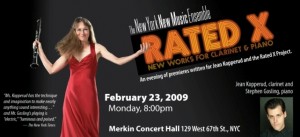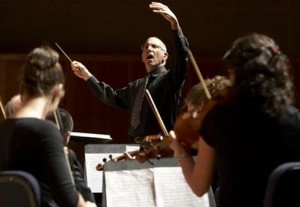 Interpretations continues its twentieth season of provocative programming in New York City. Founded and curated by baritone Thomas Buckner in 1989, Interpretations focuses on the relationship between contemporary composers from both jazz and classical backgrounds and their interpreters, whether the composers themselves or performers who specialize in new music. To celebrate, Jerry Bowles has invited the artists involved in this season’s concerts to blog about their Interpretations experiences. On 9 April 2009, pianist Teresa McCollough presents a recital of music by Alvin Singleton, Sam Pluta, Gabriela Lena Frank, John Adams, and George Crumb.
Interpretations continues its twentieth season of provocative programming in New York City. Founded and curated by baritone Thomas Buckner in 1989, Interpretations focuses on the relationship between contemporary composers from both jazz and classical backgrounds and their interpreters, whether the composers themselves or performers who specialize in new music. To celebrate, Jerry Bowles has invited the artists involved in this season’s concerts to blog about their Interpretations experiences. On 9 April 2009, pianist Teresa McCollough presents a recital of music by Alvin Singleton, Sam Pluta, Gabriela Lena Frank, John Adams, and George Crumb.
In Tribute
I have been asked to write about my upcoming concert on the Interpretations Series, in celebration of its 20th season. As this is my first time playing on this series, I want to talk not only about the upcoming concert and my connection to the program and its composers, but also about my connection to Tom Buckner, its founder and musical director, with whom I share a passion for commissioning and playing new music. It is a tribute to Tom, and his considerable vision and spirit, that Interpretations is reaching the milestone of its 20th year, and I am honored to be a part of this exciting anniversary observance.
Tom and I met a few years ago through our mutual friend and fabulous composer, Alvin Singleton. Both Tom and I had commissioned Alvin for different works, and Alvin thought we might want to get to know each other. Tom and I spoke on the phone for nearly an hour about our shared passion for new music and support for composers, and at the end of that conversation, we had arranged for Tom to bring Alvin’s latest composition Say You Have this Ball of Meaning, to the 2006 Santa Clara New Music Festival, where it received its West coast premiere to great success.
Tom has visited Santa Clara University (his alma mater) several times, and most recently after a very inspiring guest recital, he gave a talk to the students about his experience with new music and improvisation, that was both passionate and realistic. He spoke at length about his artistic process, which included a commitment to learning new works through regular improvisation and rehearsal sessions as a young man honing his craft, living and studying in the Bay area. Tom gathered other artists and composers at his house, where he held regular reading and improvisation sessions, followed by monthly concerts of those works that had been discovered so thoroughly. Along the way, he met many great composers, such as Robert Ashley and Roscoe Mitchell, and other experimental artists who were living and making up the fabric of west coast new music at that time. He created a life in experimental art that is almost forgotten in today’s professional world of learning a new piece just well enough to race to the next gig. Tom suggested a method for hearing and creating new music that recalled a slower time of deeper listening. The students could relate all too well to this leading artist and advocate who mirrored their current image of creating new compositions. Their sound world is as fresh as Tom’s was thirty-five years ago, and with more resources and outlets for communication. The weekly jam sessions that they hold with their bands and ensembles are explorations of new music with living composers and artists whom we will hear from in a few years. Making great music takes time, and it’s one’s process with that art form that makes the journey worthwhile. A venerable series, like Interpretations, didn’t spring up overnight, and great artists become so only after developing a life in music that is not only dedicated, but open to change. Contemporary music can be most accessible, if it is communicated with passion and supported with great resources. The continued success of a series such as Interpretations depends upon its artistic vision and leadership, as well as many years of dedication and hard work. My hat is off to Tom, without whom there might not be so many great works in this genre, or so many artists and composers who have received such generous support.
For my own part, I have chosen a program that I hope will be a tribute to this long-lasting series and which communicates that spirit which I believe exists when composers and artists share an admiration and respect for each other’s unique sound worlds. I have a passion for this music, and a desire to share it with an audience. Whether it is the musical mystery of George Crumb’s music played on the strings of the piano, or the experimental sounds of Sam Pluta’s crushed soda cans interwoven with a palate of piano jazz and improvisation, it is meaningful to me, and related in one way or another. Gabriela Frank’s Requiem explores the symbolism of the Day of the Dead ritual, while John Adams’ Hallelujah Junction is a work with a title that might seem to mean more than it does. Greed Machine by Alvin Singleton explores the timbres of vibraphone and piano through sound and time, while China Gates explores time through its sound repetition and displacement. All of these pieces explore the full range and capabilities of the piano and its inherent percussive possibilities played against a backdrop of various drums, gongs, chimes, and mallet instruments. It is playing, plucking, pounding, and improvising. It is a journey though music which might be inspired by spiritual sources, and inspired music that is musically unique and perhaps, spiritual. It will be a performance open to interpretation for all its listeners, prompted by an anniversary that is a true cause for celebration.
Teresa McCollough performs at Roulette on Thursday 9 April 2009.
For more information:
Teresa McCollough
Interpretations
Roulette
 We’ve reached the final concert of Interpretations’ twentieth season of provocative programming in New York City! Founded and curated by baritone Thomas Buckner in 1989, Interpretations focuses on the relationship between contemporary composers from both jazz and classical backgrounds and their interpreters, whether the composers themselves or performers who specialize in new music. To celebrate, Jerry Bowles has invited the artists involved in this season’s concerts to blog about their Interpretations experiences. Our last concert is also an anniversary celebration: The String Trio of New York has been going strong for 31 years. Guitarist James Emery and bassist John Lindberg have invited some of the most innovative jazz violinists to work with them: Billy Bang, Regina Carter, Diane Monroe, and Charles Burnham. Since 2001, violinist Rob Thomas has more than ably filled those shoes. While the trio has had many works written for them, and does perform the “classics” of jazz, this concert will feature the music of Emery and Lindberg. John Lindberg explains in his own words, below. We hope to see you at Roulette this Thursday, 23 April and stay tuned for next season.
We’ve reached the final concert of Interpretations’ twentieth season of provocative programming in New York City! Founded and curated by baritone Thomas Buckner in 1989, Interpretations focuses on the relationship between contemporary composers from both jazz and classical backgrounds and their interpreters, whether the composers themselves or performers who specialize in new music. To celebrate, Jerry Bowles has invited the artists involved in this season’s concerts to blog about their Interpretations experiences. Our last concert is also an anniversary celebration: The String Trio of New York has been going strong for 31 years. Guitarist James Emery and bassist John Lindberg have invited some of the most innovative jazz violinists to work with them: Billy Bang, Regina Carter, Diane Monroe, and Charles Burnham. Since 2001, violinist Rob Thomas has more than ably filled those shoes. While the trio has had many works written for them, and does perform the “classics” of jazz, this concert will feature the music of Emery and Lindberg. John Lindberg explains in his own words, below. We hope to see you at Roulette this Thursday, 23 April and stay tuned for next season. Apropos this Wednesday’s Michael Gordon Trance performance
Apropos this Wednesday’s Michael Gordon Trance performance  It’s hard to imagine a percussionist that you would want to perform your music more than
It’s hard to imagine a percussionist that you would want to perform your music more than 


 Interpretations continues its twentieth season of provocative programming in New York City. Founded and curated by baritone Thomas Buckner in 1989, Interpretations focuses on the relationship between contemporary composers from both jazz and classical backgrounds and their interpreters, whether the composers themselves or performers who specialize in new music. To celebrate, Jerry Bowles has invited the artists involved in this season’s concerts to blog about their Interpretations experiences. The concert on 12 March 2009 is a recital by the producer himself, baritone Thomas Buckner. He took time out of his
Interpretations continues its twentieth season of provocative programming in New York City. Founded and curated by baritone Thomas Buckner in 1989, Interpretations focuses on the relationship between contemporary composers from both jazz and classical backgrounds and their interpreters, whether the composers themselves or performers who specialize in new music. To celebrate, Jerry Bowles has invited the artists involved in this season’s concerts to blog about their Interpretations experiences. The concert on 12 March 2009 is a recital by the producer himself, baritone Thomas Buckner. He took time out of his 
